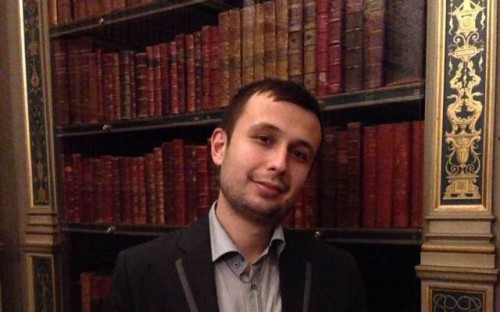The Moscow-based business he worked for, Symbio, was part of a surge of tech-based start-ups in Russia that were growing at speed. It was an exciting industry and Vladimir developed a passion for his work.
But when he began an MBA in the UK at the University of Bath School of Management, it became clear that visa laws would make it tricky to launch a corporate career in the region.
Indeed, many UK-based companies have had to adapt to UK Border Agency (UKBA) regulations that can make it difficult to hire international staff through employer-sponsored visas.
Graduates seeking MBA Jobs often fear that big firms are put off by the process, hiring home-grown MBAs instead.
Vlad speaks with confidence; he is an MBA graduate extremely happy at his current position, now a finance pricing specialist at Intel Corporation – and is adamant the company and Bath were instrumental in allowing him to work long-term in the UK.
But his joy masks a rather arduous journey.
“Realistically it is extremely difficult to land a job without the right to work in the UK. And it’s a willingness for the company to take that extra step that makes the difference,” Vlad says, ruefully.
Getting an MBA from Bath was always supposed to be a sure-fire way to a new career. Over 90 per cent of their cohort is employed within three months of graduation, and The Economist ranks the Bath MBA first in the UK for “increase in salary”.
International students, too, flock to the English business school in great numbers. Almost 90 per cent of Bath’s MBA class are international, with a range of MBA Scholarships available, racking up a combined value of over £250,000.
So when Vlad encountered difficulty, the careers team at Bath were a great help. “In the last year or so,” he says, “even filling in a job application, there is a tricky question: do you have the right to work in the UK?
“I found that if you answer ‘No’, some companies won’t hire you.” Yet there was a light when Vlad began the hiring process at Intel – a huge employer of MBA graduates in the UK.
“With Intel it was much easier because they supported me with all the legal work,” he explains. “They did pretty much everything for me. Without their willingness, it wouldn’t have been possible. There is no recipe for this, just determination.”
Roll back the clock a few years and Vlad’s path couldn’t have been more different. Before entrepreneurship with a bio-tech start-up, he attended the Russian Academy of Law. He wanted to make some extra money after graduating and worked as a legal counsel in the country’s capital.
“I was very interested in civil law but after that experience I realized it is not the area I’m truly passionate about. It was a key reason for my switch of careers,” he says.
After working as an insurance consultant for a number of years, he linked up with the tech start-up after it had been founded. They won tenure, secured investment from one of Russia’s biggest foundations and were in business for two years. But at the 24-month mark, Vlad left to pursue business school.
The UK has some of the highest MBA Ranking university’s in the Western world and Bath, with its 12-month program, seemed an ideal investment at the time. The international exposure you get in the UK was not commonplace in Russian-based business schools, Vlad says.
“I wanted to take time off work and think through what I wanted to do with my career in the long-term,” he reflects. “I needed to be in a multi-national environment with a business school that holds a world-renowned reputation.
“Bath is a beautiful town and the university has a really high ranking.” But what really set them apart was a phone-call he had with MBA staff. “It was a split-second decision to look at MBAs in the UK, and when I phoned Bath I ended up speaking with someone for over an hour,” says Vlad.
“The way she worked with me as a human being, and not an applicant, was really appealing. Maybe I’m just a bit weak when it comes to people being nice to me. But now at the end of my studies, I know I’ve made the best choice possible.”
If MBA programs are all about careers, then Vlad’s time in the British b-school system was a success on every level. He is in a full-time role with Intel now, but first entered the company on an MBA Project Placement.
Almost a dozen Bath MBAs applied for the position – and only two got in. Was it tough to land the placement? “Oh yes. There was quite a bit of competition,” he says. “You’re up against highly trained professionals who have years of experience; it’s a tough competition.
“You have 30 minutes to impress the Intel representative with a presentation and by talking about yourself.” It doesn’t sound easy. Yet it is no less competitive than many summer internships that are commonplace on MBA programs across the globe.
Vlad came through with flying colors. He joined Intel on a full-time basis and, without Bath; he feels it would have been near impossible. “I would not be working here right now without Bath,” he says. “The entire placement came through Bath’s career office.”
For all the initial difficulty surrounding his right to work in the UK, Bath and Intel made it easy in the end. “I got support from the career office, from admins, teaching staff and my supervisor, whom is ultimately responsible for me working at Intel,” Vlad says.
“I’m absolutely certain an MBA was essential in me getting this job. It would have been much more difficult without getting that three-month placement. It was critical to land this job and I don’t think I’d get it without this placement – and without Bath in the first place.”
He thinks international students should get MBAs so they can work abroad – in the UK and beyond – and advises them to secure summer internships in the countries they hope to work in.
It might have been a difficult process, but for Vlad is was reward worth the risk. Many UK-based companies are adapting to via regulations and are eager to recruit international MBA students.
There is a perception that employers avoid taking on international graduates. But there shouldn’t be.
RECAPTHA :
48
f5
d5
9a








